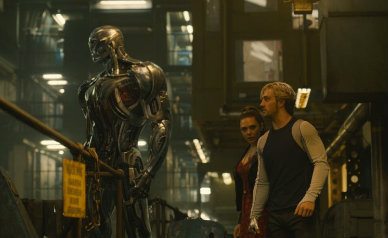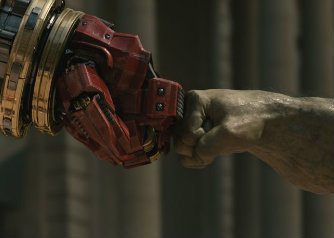Avengers: Age of Ultron
Director: Joss Whedon
Cast: Robert Downey Jr., Chris Evans, Scarlet Johansson, Chris Hemsworth
Length: 141 mins
Country: USA
A solid if somewhat underwhelming sequel, Avengers: Age of Ultron (2015), perhaps inevitably, fails to match up to the excitement of its predecessor. It’s an admirable if flawed effort from writer-director Joss Whedon, as his creative sensibility finds itself at odds with the wider strictures of a Marvel Cinematic Universe that continues to expand both as a mythology and as a corporate entity.
The film begins as it means to go on: right in the midst of the action, as the Avengers descend upon the heavily fortified castle of Hydra leader Baron von Strucker (Thomas Kretschmann) in an attempt to recover Loki’s scepter. Its here that we first meet the super-powered twins Pietro and Wanda Maximoff (Aaron Taylor-Johnson and Elisabeth Olsen), orphans modified by Strucker’s experiments with the scepter. Looking to settle an old grudge, the pair proceeds to soundly defeat the team. This loss affects Tony Stark (Robert Downey Jr.) most of all, who, having recovered the scepter during the conflict, secretly uses it to activate a global A.I. defence system designed by himself and Banner (Mark Ruffalo). To the surprise of no one, the supposedly benevolent Ultron (James Spader) immediately turns on its creator, judging humanity – and the Avengers in particular – to be the true obstacle in the way of a peaceful Earth under the rule of the machines.
It’s an admirable if flawed effort from writer-director Joss Whedon, as his creative sensibility finds itself at odds with the wider strictures of a Marvel Cinematic Universe
Ultron offers a suitably formidable villain then, if one a little thinly sketched. The character is best realised through the voice acting of James Spader, as his wryly-delivered lines and rich intonation of voice bring a decidedly human aspect to the performance. In every other regard however the character continues the MCU’s tradition of bland villains + Loki (and more recently, The Kingpin), as Ultron is only ever vaguely defined through a mish-mash of common A.I. tropes and conventions; automatically megalomaniacal and homicidal, and in possession of a God complex passed straight down from its narcissistic creator Tony Stark. The two new additions of Quicksilver and Scarlet Witch help to compliment the one-note Ultron somewhat, although even they are defined almost entirely by their powers. Still, the actors’ do the best with what they’ve been given (minus some shaky Eastern European accents).
Unfortunately, the plot is hindered by the inclusion of all these new characters – each given minimal screen time – in a film with far too many moving parts. The same could be said for the action, an impressive hyperkinetic spectacle that nevertheless lacks the visceral immediacy that made the set pieces in recent Marvel highlight Captain America: The Winter Soldier so enthralling. At its best, this flurried crosscutting between characters evokes the gloriously ridiculous nature of comic book action. More often than not however it just detracts from the viewing experience. Whedon attempts to ground all of this by taking those most underutilised in the last film; namely, Hawkeye (Jeremy Renner) and Black Widow (Scarlet Johansson), and positioning them as the beating ‘human’ heart of the second installment. The problem then lies in the lack of emotional investment in these new developments: the reveal that Hawkeye has a family back home proves earnest, yet ultimately has little payoff (though his character does at least get a few choice quips throughout the film), and Romanoff’s burgeoning romance with Banner – admittedly sold well by the two actors – seemingly materialises out of thin air, undermining previous connections with both Hawkeye and Captain America (Chris Evans).
A disjointed and cluttered affair, Age of Ultron feels like a transitional piece more than anything else. The viewer’s level of enjoyment relies heavily on context provided by other films, an intertextuality that is both the crowning achievement and bane of the MCU. As such, Whedon is often waylaid – Thor’s entirely misplaced subplot comes to mind – by a corporate force that demands he not only harken back to previous releases but also preempt Marvel’s ‘Phase Three’ films.
Whedon’s real success comes in the off-grid moments, where his penchant for large ensembles and unusual family structures helps to bring a cohesive feel to the disparate cast, whilst simultaneously emphasising the increasingly shaky and discordant nature of their character’s relationships. Stark comes across as particularly unlikeable, his and Banner’s mad scientist transgressions quickly swept under the rug once the android Vision appears (a vital new addition to the cast and well-deserved payoff to Paul Bettany’s long-term investment in the franchise). In this instance natural character and plot development are artificially deferred, as the growing ideological schism of the Avenger’s team is saved for Captain America: Civil War; again, looking increasingly less like an individual character piece, and more like Avengers 2.5. Its sad then that Whedon’s creation should buckle under the collective weight of all the groundwork it has to lay, in the good, but not great Avengers: Age of Ultron.
Images: Marvel.com



Comments